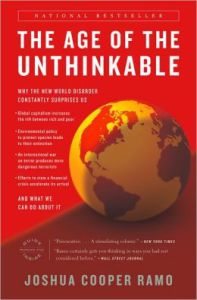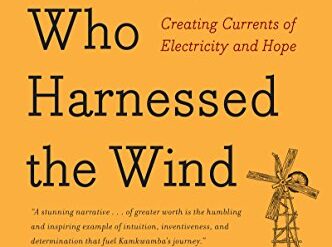
Resiliency. Maybe that was what was lacking. In the opening pages of The Age of the Unthinkable, his book about resiliency, Joshua Cooper Ramo cites long-time Federal Reserve Chairman Alan Greenspan’s 2008 testimony to Congress on finding a “flaw” in his reasoning about how to manage the economy.
Estimated reading time: 5 minutes
“In other words,” Greenspan’s questioner said, “you found that your view of the world, your ideology, was not right. It was not working?”
Greenspan replied, “Absolutely. . . I was shocked. Because I have been going for forty years or more with very considerable evidence that it was working very well indeed.”
If Alan Greenspan were the only world leader who found himself at a loss to explain why his policies had gone awry, we wouldn’t be facing so many crises simultaneously. But he is far from the only one. He’s just the only one with high name recognition who has honestly and publicly admitted how baffled he is that, in effect, everything he knew was wrong. “The sum of their misconceptions,” Ramo writes, “has now produced a tragic paradox: policies designed to make us safer instead make the world more perilous.
The Age of the Unthinkable: Why the New World Disorder Constantly Surprises Us and What We Can Do About It by Joshua Cooper Ramo ★★★★★
History’s grandest war against terrorism, for instance, not only failed to eliminate terrorism, it creates more dangerous terrorists. Attempts to stop the spread of nuclear weapons instead encourage countries to accelerate their quest for an atom bomb. Global capitalism, intended to boost the quality of life of people around the world, claws the gap between rich and poor ever wider.” And the litany goes on: financial regulation, environmental protections, Middle East peace initiatives — every major effort to confront a threat to human well-being seems to backfire with unintended consequences.
In The Age of the Unthinkable, Ramo explains patiently and brilliantly that this is so because, at the most fundamental level, the architecture of civilization has become unimaginably complex. He turns to little-known cognitive scientists, terrorists, ecologists, military leaders, venture capitalists, and other insightful observers in their own fields to illuminate the larger challenge: that the way our brains work and the way we have been taught to think in the West equip us poorly to cope with the emergent properties that inevitably appear when complex systems are tweaked. The only way to survive over the long haul in such circumstances is always to view the Big Picture and to build resiliency into every system — military, financial, environmental, you-name-it.
Contrasting American and Chinese thinking
In one of the most revealing scenes in the book, Ramo refers to research conducted at the University of Michigan contrasting the ways American and Chinese students viewed a series of the same images. Each image depicted a large object in the foreground (a tiger, for example) with its environment shown in the background. The American students devoted an overwhelming proportion of their time to viewing the foreground objects and later proved largely incapable of describing the backgrounds against which they appeared. The Chinese students focused on the environment, viewing each picture holistically and spending only a limited amount of time on the objects in the foreground.
Ramo points to this contrast (Greenspan’s “flaw”) as a signal of what’s wrong in the Western approach to problem-solving. Given any problem, we’re schooled to attack it head-on, ignoring the context and often the possible repercussions of our actions. Instead, Ramo argues, we should take several steps backward, view every problem as the manifestation of numerous intersecting factors, and look for indirect ways to prod the system to make an end run around the problem.
Watching Iranian TV to understand how insurgents think
For instance, Ramo cites the work of General Aharon Farkash, Israel’s most successful leader of military intelligence, who found that head-on attacks against insurgents invariably led to failure and that asking the usual questions would lead only to confusion. Rather than focus exclusively on the movement of arms through Iranian border crossings, for example, Farkash asked his agents to study the most popular show on Iranian TV to understand what was new in their adversaries’ thinking. “Focus on things that move and change,” Farkash insisted. Ramo sees that injunction as essential for a successful response to the challenges of the future.
The Age of the Unthinkable is now on my short list of contemporary books that truly help explain how the world works today. It’s one of the most thought-provoking works I’ve read in many years.
According to Wikipedia, Joshua Cooper Ramo is a former senior editor and foreign editor of Time magazine and later Vice Chairman at Kissinger Associates, the consulting firm of former U.S. Secretary of State Henry Kissinger. His background equips him well to write a book about resiliency.
For related reading
This is one of the books I’ve included in my post, Gaining a global perspective on the world around us.
Like to read books about politics and current affairs? Check out Top 10 nonfiction books about politics.
If you enjoy reading nonfiction in general, you might also enjoy:
- Science explained in 10 excellent popular books
- 10 great biographies
- My 10 favorite books about business history
And you can always find my most popular reviews, and the most recent ones, on the Home Page.



























